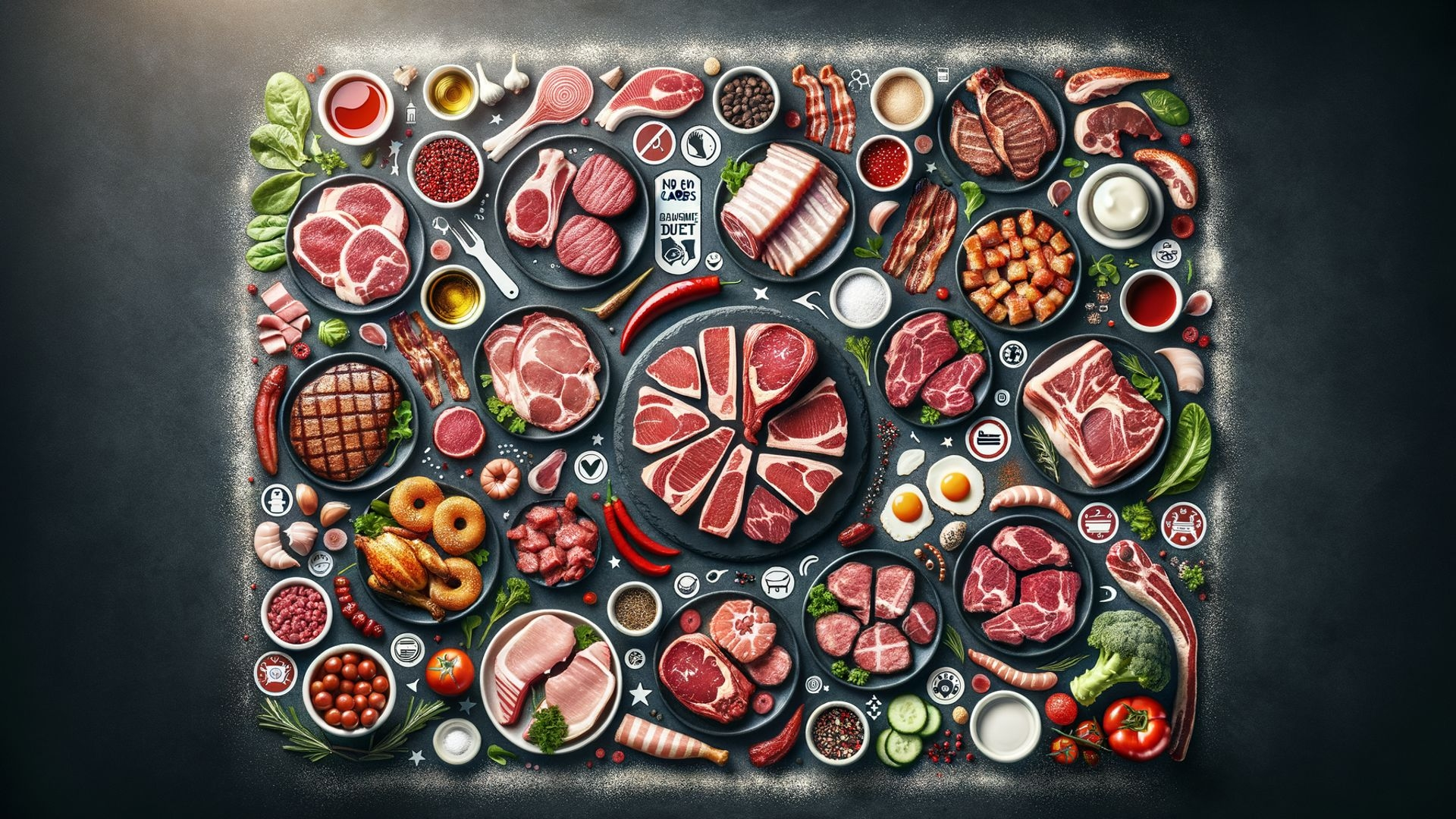Welcome to the World of Carnivore Diet Ruminants
What is the Carnivore Diet and How Does It Work?
The carnivore diet, also known as the lion diet or all-meat diet, is a way of eating that involves consuming animal products exclusively. This diet, often seen as an elimination diet, focuses on ruminant meats like lamb, beef, and bison, and promotes the intake of fat, particularly saturated fat. The carnivore diet’s principle is to exclude all plant-based foods, grains, and sugary items, essentially following a strict animal-based diet that is free from carbohydrates and plant foods.
Benefits of Following the Carnivore Diet
Advocates of the carnivore diet believe that eliminating plant-based foods may help in managing autoimmune conditions and digestive issues. Proponents claim improved energy levels, weight loss, and reduced inflammation as some of the benefits of this way of eating. By focusing on meat-based diets, individuals following the carnivore diet aim to enhance nutrient absorption and promote better metabolic health. Some supporters of the carnivore diet also suggest that removing plant-based foods can help improve mental clarity and cognitive function.
They argue that the high levels of antioxidants found in plant foods can lead to oxidative stress, which may impact brain health. By consuming solely animal products, advocates believe they can support optimal brain function and overall well-being. Additionally, proponents of the carnivore diet argue that humans are naturally meant to consume animal products as their primary source of nutrition.
They point to our ancestral diets, which relied heavily on meat for sustenance, as evidence that a carnivorous way of eating is more in line with our physiological needs. While the carnivore diet has its supporters, critics raise concerns about potential nutrient deficiencies, particularly in vitamins and minerals found in plant-based foods. They also question the long-term sustainability and health implications of consuming large amounts of meat, which is typically high in saturated fat and cholesterol.
Ultimately, the decision to follow a carnivore diet should be made carefully and with consideration of individual health needs and preferences. It is always recommended to consult with a healthcare provider or registered dietitian before making significant changes to your diet.
How the Carnivore Diet Impacts Health
When individuals adopt the carnivore diet, they significantly reduce their intake of carbohydrates and increase their consumption of saturated fats and essential nutrients found in ruminant meats and organ meats like beef liver. While some studies suggest potential risks of high saturated fat diets in relation to heart disease, the proponents of the carnivore diet argue that the elimination of carbohydrates and plant foods allows the body to adapt to using fats as a primary energy source, potentially improving overall health and well-being.
One of the main arguments in favor of the carnivore diet is its potential benefits for individuals with certain health conditions such as autoimmune diseases, digestive disorders, or obesity. By eliminating plant foods that can trigger inflammation or digestive issues in some individuals, the carnivore diet may alleviate symptoms and improve overall health in these populations. Some proponents also argue that consuming high quality ruminant meats and organ meats can provide essential nutrients that are difficult to obtain from plant-based sources alone, such as Vitamin B12, iron, and omega-3 fatty acids.
However, it is important to note that the carnivore diet is highly restrictive and may not be suitable for everyone. The long-term effects of consuming large amounts of saturated fats from animal sources are still not fully understood, and some experts caution that a diet high in saturated fats may increase the risk of heart disease and other chronic conditions. Additionally, the elimination of carbohydrates from the diet can lead to nutrient deficiencies and lack of fiber, which are important for overall health and digestion.
In conclusion, while the carnivore diet may have potential benefits for some individuals, particularly those with specific health conditions, it is important to approach this diet with caution and consult with a healthcare professional before making significant changes to your eating habits. It is always important to consider the overall balance of nutrients in your diet and ensure that you are meeting your body’s needs for optimal health and well-being.
What Foods Can You Eat on the Carnivore Diet?
Approved Food List for the Carnivore Diet
The carnivore diet food list primarily consists of animal food, such as ruminant animal meats, beef sourced from grass-fed animals, and bison. It includes ruminant animals processed in various forms, like ground beef, to offer flexibility in meal preparation while adhering to a strict carnivore eating plan. Other meats that are commonly consumed on a carnivore diet include lamb, pork, chicken, turkey, and organ meats like liver and kidney.
Fish and seafood, such as salmon, tuna, shrimp, and mussels are also allowed on the diet.
Dairy products like cheese, butter, and heavy cream are typically included in small amounts for those who tolerate them well. Eggs are another important protein source on the carnivore diet. Bone broth is often consumed for its nutrient-dense properties, providing essential minerals and amino acids.
Some carnivore dieters also include small amounts of animal-based fats like lard, tallow, and duck fat for cooking. It’s important to select high-quality, pasture-raised or wild-caught animal products to ensure that you’re getting the most nutrients from your food. Avoid processed meats, deli meats, and any products that contain added sugars or artificial ingredients.
Ruminant and Red Meat Consumption on the Carnivore Diet
Ruminant meat consumption is a key feature of the carnivore diet due to its rich nutrient profile, including essential fatty acids and b vitamins. Including red meat in the diet provides essential nutrients that are often lacking in other diets. Organ meats, such as beef liver, heart, and kidney, are also highly beneficial for their rich nutrient content. Beef liver, in particular, is a nutritional powerhouse, containing high levels of iron, zinc, vitamin A, and B vitamins.
These nutrients are essential for maintaining healthy blood cells, supporting immune function, and promoting optimal brain function. Overall, including ruminant meats in the diet can help ensure that you are getting a wide range of essential nutrients that are necessary for overall health and well-being. Whether you choose to follow a strict carnivore diet or simply incorporate more red meat into your meals, incorporating ruminant meats can provide a significant nutritional boost.

Benefits of Including Organ Meat in Your Diet
Organ meats are nutrient-dense foods that can help ensure the diet remains nutritionally balanced. Incorporating organ meats like liver and heart can provide important vitamins and minerals necessary for overall health and well-being, making them an essential component of a meat-only diet.
Organ meats are particularly rich in important nutrients such as vitamin A, vitamin B12, iron, zinc, and copper. These nutrients play crucial roles in various bodily functions, including immune function, energy production, and red blood cell formation. For example, liver is one of the best dietary sources of vitamin A, which is essential for proper vision, immune function, and skin health. The heart is a great source of CoQ10, an antioxidant that helps protect cells from damage and supports heart health.
Incorporating organ meats into a meat-only diet can help prevent nutrient deficiencies and ensure that the body is getting all the essential vitamins and minerals it needs to function optimally. Organ meats are also a great source of high-quality protein, which is important for muscle growth and repair. They are also typically more affordable than other cuts of meat, making them a cost-effective option for those on a budget.
Overall, organ meats are a nutrient-dense food that can provide a wide range of important vitamins and minerals necessary for overall health. Including them in a meat-only diet can help maintain proper nutrient balance and support optimal health and well-being.
Creating a Meal Plan for the Carnivore Diet
Tips for Planning Your Carnivore Diet Meals
Crafting a meal plan for the carnivore diet involves identifying food groups within the animal-based diet to ensure nutritional adequacy. Including a variety of ruminant meats and organ meats while using salt and water as primary seasonings can help maintain balance and meet daily nutritional requirements.
Here is a suggested meal plan for the carnivore diet:
Breakfast:
– Scrambled eggs cooked in bacon fat
– Bacon strips
– Liver pate on the side
– Black coffee or bone broth
Lunch:
– Ribeye steak cooked in butter
– Beef liver cooked with onions
– Side of bone marrow
– Water with a pinch of salt
Dinner:
– Grilled chicken thighs with skin
– Lamb chops
– Beef heart stew
– Side of bone broth
Snacks:
– Beef jerky
– Boiled eggs
– Pork rinds
Remember to listen to your body and adjust portion sizes and meal frequency to suit your individual needs and preferences. It’s important to stay hydrated and ensure you are getting enough electrolytes, so drinking water with added salt throughout the day can help with this. Consult with a healthcare professional before starting any new diet, especially one as restrictive as the carnivore diet, to ensure it is safe and appropriate for you.

Sample Meal Plan for a Week on the Carnivore Diet
A standard carnivore diet meal plan may consist of beef, lamb, and organ meats consumed throughout the week. Ground beef, lamb chops, and beef liver can be rotated to provide a mix of nutrients and keep the diet interesting and sustainable.
Here is an example of a carnivore diet meal plan for one week:
Day 1:
– Breakfast: Ground beef cooked with butter
– Lunch: Lamb chops with a side of grilled vegetables
– Dinner: Beef liver sautéed with onions and garlic
Day 2:
– Breakfast: Lamb sausage patties with eggs
– Lunch: Beef steak with a side salad
– Dinner: Beef heart skewers with grilled mushrooms
Day 3:
– Breakfast: Beef bacon with scrambled eggs
– Lunch: Lamb kebabs with tzatziki sauce
– Dinner: Beef tongue tacos with avocado and salsa
Day 4:
– Breakfast: Beef liver pate on cucumber slices
– Lunch: Lamb stew with carrots and celery
– Dinner: Beef ribs with a side of coleslaw
Day 5:
– Breakfast: Lamb burgers topped with cheese
– Lunch: Beef brisket with broccoli
– Dinner: Beef marrow bones roasted with garlic and herbs
Day 6:
– Breakfast: Beef sausage links with sautéed spinach
– Lunch: Lamb shoulder roast with roasted brussels sprouts
– Dinner: Beef kidney stew with onions and peppers
Day 7:
– Breakfast: Beef liver and eggs scrambled together
– Lunch: Lamb chops with a side of cauliflower rice
– Dinner: Beef sirloin tip roast with asparagus
Remember to listen to your body and adjust the portion sizes and variety of meats according to your individual needs and preferences. Be sure to consult with a healthcare professional or nutritionist before making significant changes to your diet.
How to Incorporate Variety within a Meat-Only Diet
While the carnivore diet may seem restrictive, incorporating different cuts of meat, experimenting with cooking styles, and exploring seasonings can add variety to the eating plan. This approach can help maintain interest in the diet and prevent monotony in food choices. Additionally, adding some non-meat foods that are still compatible with the carnivore diet, such as eggs, dairy products, and certain types of seafood, can provide additional nutrients and flavors to meals.
For those looking to add variety to their carnivore diet, here are some tips to spice things up:
1. Try different cuts of meat: Experiment with different cuts of beef, pork, chicken, and lamb to see which ones you enjoy the most. Each cut has its own unique flavor and texture, so you may find that you prefer certain cuts over others.
2. Explore different cooking styles: Whether you prefer grilling, roasting, or slow-cooking, there are many ways to prepare meat that can bring out different flavors and textures. Try marinating meat in different seasonings or sauces before cooking to add extra flavor.
3. Mix up your seasonings: While salt and pepper are staples in a carnivore diet, there are many other seasonings you can experiment with to add variety to your meals. Try different herbs, spices, and rubs to enhance the flavor of your meat dishes.
4. Incorporate dairy products: If you tolerate dairy, adding cheese, yogurt, or milk to your meals can provide additional flavor and nutrients. Consider adding cheese to your burgers, topping your steak with a dollop of butter, or enjoying a glass of milk with your meal.
5. Include eggs and seafood: While not technically part of a strict carnivore diet, eggs and certain types of seafood can be included to add variety and nutrients to your meals. Try incorporating eggs into your breakfast or adding shrimp, salmon, or tuna to your meals for a change of pace.
Overall, adding variety to a carnivore diet can help prevent boredom and ensure that you are getting a wide range of nutrients. Experimenting with different cuts of meat, cooking styles, seasonings, and incorporating some non-meat foods can help make the diet more sustainable and enjoyable in the long run.

Understanding the Health Benefits and Risks of a Carnivore Diet
Effects of Saturated Fat Consumption on the Carnivore Diet
Saturated fat consumption, a common feature of the carnivore diet, has been linked to concerns related to heart disease in conventional dietary guidelines. However, proponents of the carnivore diet argue that the absence of carbohydrates shifts the body’s metabolism towards burning fats for energy, which can potentially offer metabolic benefits.
While it is true that saturated fat has historically been demonized in mainstream dietary guidelines, recent research has called into question the link between saturated fat consumption and heart disease. Some studies have suggested that saturated fat may not be as harmful as previously thought, and that its effects on heart health may be more complex than originally believed.
Proponents of the carnivore diet argue that by eliminating carbohydrates and increasing fat consumption, the body is forced to rely on fats for energy, which can lead to improved metabolism and weight loss. They claim that the carnivore diet can improve insulin sensitivity, reduce inflammation, and promote overall health.
Potential Risks of Following a Highly Restrictive Diet
Following a highly restrictive diet like the carnivore diet may pose risks in long-term nutritional adequacy, potentially leading to deficiencies in certain vitamins and minerals. Monitoring nutrient intake and considering supplementation might be necessary for some individuals to avoid any deficiencies.
Some potential risks associated with following a carnivore diet include:
1. Lack of fiber: The carnivore diet eliminates all plant-based foods, including fruits, vegetables, and grains, which are important sources of dietary fiber. A lack of fiber in the diet can lead to digestive issues such as constipation and may negatively impact gut health.
2. Vitamin and mineral deficiencies: Plant foods are rich sources of vitamins and minerals such as vitamin C, vitamin K, and potassium. A diet that excludes these foods may lead to deficiencies in these nutrients, which can have negative effects on overall health.
3. Increased intake of saturated fats: Animal products, especially red meats, are high in saturated fats. Consuming high amounts of saturated fats has been linked to an increased risk of heart disease and other health issues.
4. Lack of variety: Eating only animal products can result in a lack of variety in the diet, which may lead to boredom, nutrient deficiencies, and an imbalance in the gut microbiome.
5. Potential for nutrient imbalance: The carnivore diet may provide an imbalance in certain nutrients, such as an excess of protein and insufficient carbohydrates or essential fatty acids.
It is important to consult with a healthcare provider or a registered dietitian before starting any restrictive diet, including the carnivore diet. They can help monitor nutrient intake, identify potential deficiencies, and recommend appropriate supplements or modifications to ensure nutritional adequacy.
Research and Controversies Surrounding the Carnivore Diet
The carnivore diet has gained attention in recent years, with both positive anecdotal reports and controversies surrounding its long-term sustainability and health implications. Research on the effects of the carnivore diet is ongoing, and further studies are required to fully understand its impact on health outcomes.
Transitioning to and Maintaining the Carnivore Diet Lifestyle
Starting the Carnivore Diet: Step-by-Step Guide
For those considering starting the carnivore diet, a gradual transition from a standard American diet may be beneficial to manage digestive changes. The sudden shift to a meat-only diet can lead to noticeable changes in digestion, and a slow introduction of ruminant meats can aid in adapting to this way of eating.
Managing Digestive Changes When Adopting a Meat-Only Diet
Transitioning to a meat-only diet can impact the gut microbiota and digestion. To counter potential issues, integrating probiotic-rich foods and maintaining hydration levels can help support digestive health and ease the process of adjusting to the carnivore diet.
Probiotic-rich foods such as yogurt, kefir, sauerkraut, and kimchi can help restore balance to the gut microbiota and promote healthy digestion. These foods contain beneficial bacteria that can aid in the breakdown and assimilation of nutrients from meat.
Additionally, staying hydrated is essential for proper digestion and can help prevent constipation, which is a common issue when transitioning to a high-meat diet. It’s also important to listen to your body and make adjustments as needed. Some individuals may find it helpful to gradually increase their intake of meat and monitor how their body reacts. Keeping a food journal can be helpful in identifying any potential triggers or issues that may arise.
Maintaining Balance and Nutritional Adequacy on a Ruminant-Based Diet
Ensuring nutritional balance on a ruminant-based diet involves identifying sources of essential nutrients like vitamins and minerals found in a variety of meats. Ruminant animals, like cattle and sheep, offer a range of vital nutrients that contribute to overall health when consumed in appropriate quantities.
Carnivore Diet Ruminants Frequently Asked Questions
What is the Lion Diet?
The Lion Diet, also known as the carnivore diet, is an animal-based diet that consists primarily of meat. It is a low-carb diet that focuses on eating animal products.
What foods are included in the Lion Diet food list?
The Lion Diet food list includes ruminant meats such as beef and lamb, as well as other types of muscle meat. It eliminates all plant-based foods and focuses solely on animal products.
How does the Lion Diet differ from a traditional diet?
The Lion Diet is different from traditional diets as it eliminates all carbohydrates and plant-based foods, focusing solely on animal protein. It is an all-meat diet that aims to mimic the way lions eat in the wild.
Is the Lion Diet suitable for everyone?
The Lion Diet may not be suitable for everyone, especially those with certain health conditions or dietary restrictions. It is important to consult with a healthcare professional before starting any new diet.
How does the Lion Diet impact your health?
The Lion Diet aims to promote optimal health by providing the body with high-quality animal protein and eliminating potentially inflammatory foods. It may benefit some individuals but may not be suitable for everyone.
What is a carnivore diet, and can ruminants follow it?
A carnivore diet consists almost entirely of animal products, focusing on meats and excluding plant-based foods. Ruminants, however, are not suited to a carnivore diet as they are herbivores by nature, adapted to digest plants with their specialized stomachs.
How does the digestive system of ruminants differ from that of true carnivores?
Ruminants have a complex four-chambered stomach designed to break down cellulose from plants through fermentation. True carnivores have a simple stomach structure with strong acids and enzymes tailored for digesting proteins and fats from animal tissue.
Would switching a ruminant to a carnivore diet affect its well-being?
Yes, it would negatively affect its well-being. Ruminants require a diet high in fibrous plant material for proper digestion and nutrient absorption. A carnivore diet lacks these essential fibers and could lead to malnutrition and gastrointestinal issues in ruminants.
Is there any situation where ruminants might consume animal products?
While very unusual, some cases show ruminants consuming small amounts of animal protein (like birds eating insects). However, this behavior is typically marginal and does not provide substantial nutrition nor replace their natural herbivorous dietary requirements.
How should one ensure the well-being of ruminant animals in terms of diet?
The well-being of ruminant animals can be ensured by providing them with an appropriate herbivorous diet rich in fibrous plants like grasses and hay, access to clean water, routine veterinary care, and suitable living conditions that allow for their natural behaviors such as grazing.






